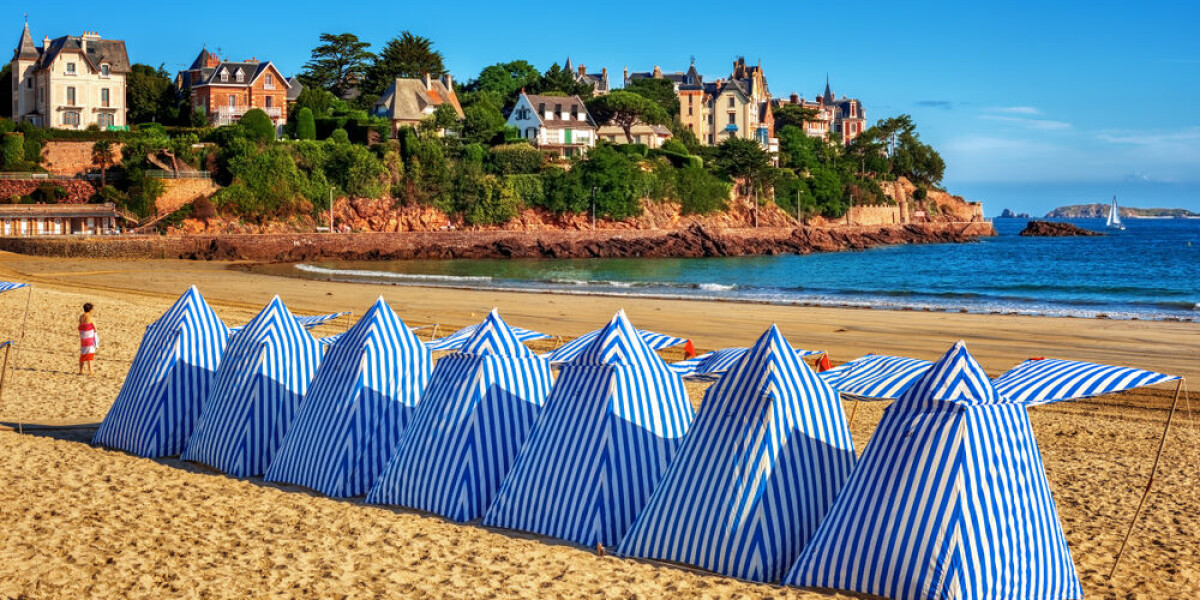
Nine words and phrases from brittany
- Select a language for the TTS:
- UK English Female
- UK English Male
- US English Female
- US English Male
- Australian Female
- Australian Male
- Language selected: (auto detect) - EN
Play all audios:

Bretons have a strong regional identity with 80% saying they were attached to Brittany, compared to 60% on average for other regions, in a recent (2021) survey. It is estimated that some
200,000 people speak Breton today. Many expressions and phrases used in the region are related to Breton. If you know Cornish you may recognise some of these phrases as the two languages are
similar. Here are nine of our favourites with their origins and the context in which they are used, almost exclusively in Brittany. We have added the pronunciation in brackets to help you…
YEC’HED MAT (‘YERED MAD’) This expression means cheers or santé and is often heard at restaurants, bars and apéros. The word is taken directly from Breton. _Yec’hed_ means health and the
‘c’h’ sound is pronounced as a soft ‘r’. _Mat_, said with a ‘d’ sound at the end, means good, so the expression literally means good health. Even if your pronunciation is not perfect on your
first attempt, any Breton will appreciate your willingness to learn their culture. MA DOUÉ (‘MA DWÉ’) The Breton way of saying Mon Dieu, or ‘My God’. This term is very common and often
punctuates a conversation. It is used to express a variety of emotions, such as surprise and regret. To emphasise that emotion, it is often followed by _benniget_, which means ‘blessed’.
Sometimes, you will hear _Va Doué_ instead, which has the same meaning. If it is getting late, you could say _Ma Doué, as-tu vu l’heure ? _(My God, have you seen the time?) MANGER COMME UNE
GOUELLE (‘GWELLE’) If you eat many _crêpes bretonnes_, you may be told that you _mange comme une gouelle_. It means someone that has a large appetite and eats a lot. It is taken from
_goéland_, the word for gull, and means to eat like a gull, birds known for having a voracious appetite. It is similar to the expression ‘eat like a horse’. Do not use this unless you are
comfortable with someone and know that they will take it well - it could offend. SKUIZH (‘SKEEZ’) _Skuizh_ means tired. It is pronounced as ‘skeez’ and it is a Breton word which has
transitioned to common usage - at least in Brittany. You can combine it with a previous expression to highlight your tiredness: _Ma Doué, je suis skuizh_ (My God, I am tired). TRUGAREZ
(‘TRU-GA-RÉ) This term means thank you. It is pronounced _tru_ with a slightly rolled r sound and a u sound like in _salut_, then _garer_ as in the French word to park. It has religious
connotations, as _trugarez_ was used to show gratitude during prayers and hymns. It is a derivative of _trugar_, which means mercy, and therefore has a similar origin as merci, however it
has maintained its religious connotation more. This does not mean you have to be religious to say it but you should not employ _trugarez_ in any situation. Use it when you really want to
express your gratitude, for example if receiving a meaningful Christmas present. FAIRE DU REUZ (‘RUZZ’) _Reuz_ is a word that does not really have a direct translation. It means noise and
commotion but it also denotes a sense of anger. The closest equivalent in English would be buzz but with a negative connotation. It is pronounced like buzz but with a slightly rolled r sound
instead of a b. Faire is the French word for make. Someone might say _Ca va faire du reuz_ before saying something controversial or unpopular, knowing that it will induce some loud
protests. ÊTRE DANS LE LAGEN (‘LAGGEN’) Spending all day on a sunny beach can be tiring. You can then say: _Je suis dans le lagen_. It means you are very tired. It can also be used when you
are hungover. A _lagen_ in Breton means a lake but in this case it refers to a swamp. It is used for a few expressions to mean something that is not going well. For example if you have been
waiting for something for a while which has still not arrived, it is _dans le lagen_. It is sometimes spelt _lagenn_ and it is an informal expression. ENVOYER _Envoyer_ is a French word
meaning to send but when used by a Breton, it also means to bring or to take. _J’ai envoyé un gâteau _means ‘I brought a cake’ and _j’ai envoyé mon frère à la gare _means ‘I took my brother
to the train station’. It is also used to mean send, so you will have to use context to figure out the intention meant by _envoyer_. KOUIGN-AMANN (‘KWEEN AMANN’) _Kouign-amann_ is not an
expression but the name of a popular Breton cake that many struggle to pronounce and spell. It was invented in Finistère on the westernmost coast and it is a symbol of Breton cuisine known
throughout France. _Kouign _is the Breton word for cake and _amann _means butter, so the term literally means butter cake. If you eat at a Breton’s house a _kouign-amann _may well be served
for dessert. You can hear how to pronounce it here, although Bretons and the rest of the French pronounce it slightly differently. RELATED ARTICLES SEVEN WORDS AND PHRASES FROM THE SOUTH OF
FRANCE EIGHT ENGLISH WORDS THAT YOU MAY NOT HAVE REALISED COME FROM FRENCH
